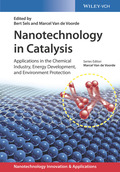Nanotechnology in Catalysis
Applications in the Chemical Industry, Energy Development, and Environment Protection
Nanotechnology Innovation & Applications

1. Edition August 2017
1190 Pages, Hardcover
600 Pictures (200 Colored Figures)
Handbook/Reference Book
Short Description
Reflecting the number of novel applications over the past decade, this handbook gives a comprehensive overview of this scientifically and economically important field, bridging fundamental research and industrial development to provide a unique perspective.
Buy now
Price: 609,00 €
Price incl. VAT, excl. Shipping
Euro prices for Wiley-VCH and Ernst & Sohn titles are only valid for Germany. In EU countries, local VAT applies. Postage will be charged.
- Out of print -
Reflecting the R&D efforts in the field that have resulted in a plethora of novel applications over the past decade, this handbook gives a comprehensive overview of the tangible benefits of nanotechnology in catalysis. By bridging fundamental research and industrial development, it provides a unique perspective on this scientifically and economically important field.
While the first three parts are devoted to preparation and characterization of nanocatalysts, the final three provide in-depth insights into their applications in the fine chemicals industry, the energy industry, and for environmental protection, with expert authors reporting on real-life applications that are on the brink of commercialization.
Timely reading for catalytic chemists, materials scientists, chemists in industry, and process engineers.
PART I. Preparation of Nanacataylsts and Their Potential in Catalysis
Liquid-Phase Synthesis of Nanocatalysts
Supported Gold Nanoparticles Leading to Green Chemistry
Application of Nanocarbon Materials to Catalysis
Nano-Oxide Mesoporous Catalysts in Heterogeneous Catalysis
Solution Combustion Synthesis, Characterization, and Catalytic Properties of Oxide Materials
Nanostructured Porous Materials: Synthesis and Catalytic Applications
Core Magnetic Composite for Catalytic Applications
Metal Nanoparticles Supported on Magnetically Separable Materials
Tuning the Activity of Supported Nanoparticles Through Charge Transfer
Metal-Organic Framework-Mediated Synthesis in Catalysis
Sustainable Routes for Synthesis of Zeolite Catalysts
Superior Porous Zeolite Catalysts
Diffusion in Nanocatalysis
Atomic Layer Deposition for Catalysis
Digital Fabrication in Catalytic Technology
VOLUME 2
PART II. Nano Catalysis for Precision on Chemicals Production and Alternative Feedstock Conversion
Nanocatalysis: A Key Role for a Sustainable Energy Future
Nickel Nanocatalysis for Methane Steam Reforming
Development and Performance of Iron Based Oxygen Carriers for Chemical Looping
New Catalytic Initiatives and Challenges in Syngas Conversion
Nonoxidative Dehydroaromatization of Methane
Oxidations with Nanocatalysis
Propane-selective Oxidation to Acrylic Acid
Catalysis in Lignocellulosic Biorefineries: The Case of Lignin Conversion
Catalysis for Biorefineries: What Industry Needs?
Transformation of Sugars Using Nanoporous Acidic Catalysts
Rational Design of Nanostructured Carbon Materials: Contribution to Cellulose Processing
Nanocatalysis in the Fast Pyrolysis of Lignocellulosic Biomass
Hydrothermal Carbonization and Its Role in Catalysis
Tailored Porous Catalysts for Esterification Processes in Biofuels Production
VOLUME 3
PART III. Nanocatalysis for Environmat Protection and Innovations in Energy Research
Challenges and Role of Catalysis in CO2 Conversion to Chemicals and Fuels
Water Splitting on Particulate Semiconducting Photocatalysts under Visible Light
Visible Light Heterogeneous Nanophotocatalysts (From Catalyst Formulation to Air, Water, and Surface Cleaning Application)
Transferring Knowledge of Electrocatalysis to Photocatalysis: Photocatalytic Water Splitting
Integrated Solar Hydrogen Devices: Cell Design and Nanostructured Components in Liquid and Vapor-Phase Water Splitting
Nanocatalysis in Solid Oxide Cells
Coproduction of Hydrogen and Chemicals by Electrochemical Reforming of Biomass-Derived Alcohols
PART IV. Characterization of Nanocatalysts and Theoretical Methodologies
Probing Inter- and Intraparticle Heterogeneity at the Micro- and Nanoscale in Solid Catalysts Using Optical Techniques
Investigation of Catalytic Surfaces with Surface-Enhanced Solid-State NMR Spectroscopy
State-of-the-Art X-Ray Spectroscopy in Catalysis
Theoretical Tool Box for a Better Catalytic Understanding
Index
Marcel Van de Voorde is special advisor at IMEC, Belgium. Recently, his knowledge and 40 years' experience in university education, research and management was honored with the gold medal of the Fondation du Mérite Européen. He studied industrial and chemical engineering and received his PhD in nuclear engineering from the Nancy-Université, France. He was co-founder and professor at the Hoger Instituut der Kempen, Geel, and the Technical Institute Don Bosco, Hoboken in Belgium. He further holds professorships at the Catholic University of Leuven, the Ghent University, the Delft University of Technology and is visiting professor at several recognized universities in Europe, US, Japan and China. He was active as advisor to various institutions such as the CERN, the European Commission and the Max Planck Institute for Solid State Research.


